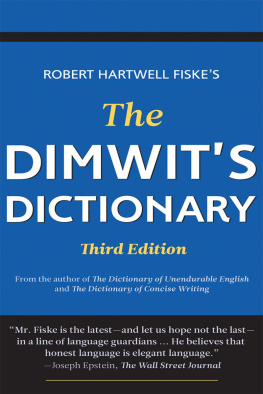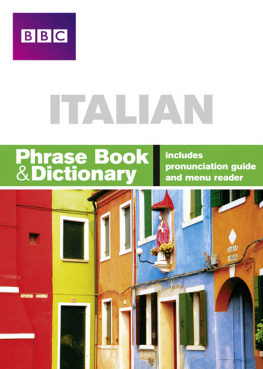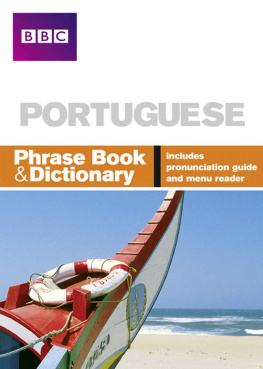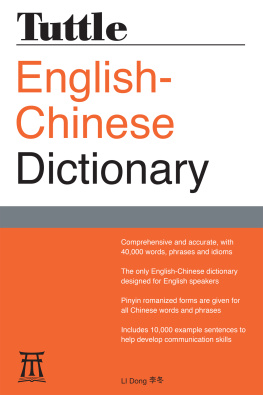
ALSO BY ROBERT HARTWELL FISKE
The Dictionary of Unendurable English
The Dimwits Dictionary

copyright 2014, 2006, 2002, 1996, 1990 by Robert Hartwell Fiske
Previous editions published under the titles The Dictionary of Concise Writing , The Writers Digest Dictionary of Concise Writing , and Guide to Concise Writing .
All rights reserved
For information about permission to reproduce selections from
this book, write to Permissions, W. W. Norton & Company, Inc.,
500 Fifth Avenue, New York, NY 10110
For information about special discounts for bulk
purchases, please contact W. W. Norton Special Sales at
specialsales@wwnorton.com or 800-233-4830
Book design by BTDnyc
Production manager: Anna Oler
Library of Congress Cataloging-in-Publication Data
Fiske, Robert Hartwell.
[Dictionary of concise writing]
To the point : a dictionary of concise writing / Robert Hartwell Fiske.
pages cm
Previous editions published under the Titles: The Dictionary of Concise Writing, The Writers Digest Dictionary Of Concise Writing, And Guide To Concise Writing.
ISBN 978-0-393-34717-3 (pbk.)
ISBN 978-0-393-24289-8 (e-book)
1. English languageRhetoricDictionaries. 2. English languageUsageDictionaries. 3. Report writingDictionaries. I. Title.
PE1464.F57 2014
808'.04203dc23
2013046070
W. W. Norton & Company, Inc.
500 Fifth Avenue, New York, N.Y. 10110
www.wwnorton.com
W. W. Norton & Company Ltd.
Castle House, 75/76 Wells Street, London W1T 3QT
To Brad and Brucemy big brothers
the one as accomplished and caring
as the other.
Contents
Words are like leaves; and where they most abound,
Much fruit of sense beneath is rarely found.
ALEXANDER POPE , Essay on Criticism
POLONIUS: What do you read, my lord?
HAMLET: Words, words, words.
WILLIAM SHAKESPEARE , Hamlet, act 2, scene 2
A barren superfluity of words.
SIR SAMUEL GARTH , The Dispensary, canto 2
Let thy words be few.
ECCLESIASTES 5:2
Reckless writers and slipshod speakers use many words where few would do.... Yet for all the words, their expression is but impoverished; more words do not necessarily signify more meaning.
Life is measured by its meaning, and a good deal of that meaning is inherent in the words we use. If so many of our words are superfluousand thus do not signifyso much of our life is, ineluctably, meaningless.
In the end, we are no more superfluous than are the words we use.
ROBERT HARTWELL FISKE , The Dimwits Dictionary
I n a letter to a twelve-year-old boy, Mark Twain wrote, I notice you use plain, simple language, short words, and brief sentences. That is the way to write Englishit is the modern way and the best way. Stick to it; dont let fluff and flowers and verbosity creep in.
Alas, with most of us, as we grow older, fluff and flowers and verbosity do creep in. Writing today often has too much fat, too little musclebulk without strength. Much of what we read these days ranges from slightly flabby to grossly obese. As children, we wrote sentences like See Dick run. As adults, we are more likely to write, It is imperative that we assiduously observe Richard as he traverses the terrain at an accelerated rate of speed. We gain girth and lose mirthand so does our prose.
What happens to peoples writing in the years between childhood and maturity? For one thing, their reasons for writing change. The child writes for the best of reasonsto tell somebody something that is worth telling. Little Janie Jones wants her friends to know about her dog, Spot. Her only concern is to share her joy that Spot is the bestest dog in the whole wide world.
Mr. Jones, Janies dad, also has something worthwhile to write abouthis companys new marketing plan, which may or may not be the bestest marketing plan in the industry. But his real reason for writing a long memo about the plan is that he wants to be perceived as having had input into the plans development. As he writes, he worries about the impression his writing might make on his colleagues, especially his boss. He chooses his words carefullythe more and the longer, the better. Even if his instinct tells him to write simply, hes afraid to, lest his memo not be taken seriously.
Janie has no such fear. While she uses a simple, clear, unaffected second-grade vocabulary, her dad draws on marketing terms he learned while earning his MBA. Relying heavily on the jargon of his business, he throws in a couple of viable alternatives, a new set of parameters, and a plan for prioritization that should be implemented at this point in timethe bureaucrats way to use seventeen letters to write now . When its done, he has produced a bloated, tedious, pompous piece of writing full of sound and fury, signifying very little.
As Janie grows older, her writing gradually becomes more like her dadslacking in warmth, sincerity, and directness. She begins to worry about impressing her classmates and teachersor even Dad, just as Dad worries about impressing his boss. In junior high, her teacher assigns the class a theme about summer vacation and insists that the composition be at least 800 words. This encourages Janie to use two or three words where one would do the job, to stretch out her composition to the 800-word minimum set by the teacher. So what might have been an interesting, tightly written 500-word piece about a trip to Disney World turns out to be just another example of dull, flabby, padded prose, wheezing away as it lurches uphill.
In addition, Janie and Mr. Jones read so much bloated writing that they start to emulate the style that seems to be the norm. Even if they were fortunate enough to have good writing instruction in school, they allow hard-learned skills to rust. They lose confidence in their ability to write clearly and convincingly. They underestimate the power and grace of the simple, declarative sentence. To get their points across, they resort to the theory that if one word is good, two words must be twice as good.
Far from contributing to the readers enlightenment, wordiness enshrouds meaning in a fog of confusion. As William Zinsser, the author, teacher, and journalist, wrote in On Writing Well , Writing improves in direct ratio to the things we can keep out of it that shouldnt be there. Cutting the fat is probably the quickest and surest way to improve. No matter how solid is your grasp of grammar, punctuation, spelling, and other fundamentals, you cannot write well unless you train yourself to write with fewer words.
If you want to create fat-free sentences and paragraphs, you will pay heed to Robert Hartwell Fiskes advice throughout the dictionary you are about to explore. He means what he says, and he says what he means.
RICHARD LEDERER
T his is a reference book and, like all such books, is meant to be referred to, not read through. Although Ive long thought works of reference, dictionaries in particular, to be among the most spellbinding books, I cannot expect everyone to agree.
I do wish, as any writer would, that this were a work of creation instead of compilation; still, whether you refer to or read through the book, it will help you write and speak more clearly.
To the Point: A Dictionary of Concise Writing consists of three parts. In the first part, I suggest how to identify and correct wordiness. The second part of the book is a compilation of several thousand wordy phrases followed by concise alternative expressions and real-world examples. I show each sentence example in its original, wordy version and then in a revised, concise version. Part three is a reverse dictionary that shows, in a left-hand column, concise entries alongside, in a right-hand column, wordy ones.
Next page













